#Literary voyage
Text
Tuvix as a metaphor for Janeway's mindset throughout Voyager
When Tuvok and Neelix merged into a new individual after a transporter malfunction, Tuvix was born. Possessing a combination of the memories and personalities of his component parts while still being his own unique self, Tuvix quickly proved he was more than just a transporter accident, showing he had potential to find his place among the crew of Voyager and settle in to this new normal.
And when Janeway learned of a way to separate him, bringing back Tuvok and Neelix, Tuvix was killed. Against his wishes, against the doctor's ethical subroutines, Tuvix was killed.
I'm not going to discuss whether or not this was right. That's an entirely different subject that many people have debated ad nauseam.
I just want to talk about how the decision to kill Tuvix and bring back Tuvok and Neelix might actually be the defining moment in developing Kathryn Janeway's mindset for the rest of the series. The sometimes questionable mindset best described as
"There's the right way, the wrong way, and the Janeway."
To Captain Janeway, Tuvix is a problem to solve. He is the thing standing in the way of the status quo, the thing preventing her from seeing her loved ones again.
She says as much, when Kes is expressing reservations about developing feelings for Tuvix and says she hasn't given up on the idea of him being separated.
You’re experiencing what people on this crew have been going through since we first got stranded in this quadrant. Do we accept that we're separated from our loved ones forever, or do we hold onto the hope that someday we'll be with them again?
Tuvix, therefore, is a physical representation of being stuck in the Delta quadrant. He is the thing preventing them from being with their loved ones, and she might not be able to get everyone home right now if ever, but she's going to do everything she can to see Tuvok and Neelix again.
Whether or not it is right for her to kill Tuvix, that isn't as important to her as proving—to herself and to her crew—that she is going to do anything she can to get them home, and killing him is a symbolic representation of that.
We see this mindset continue throughout the series, and the Lower Decks episode Twovix gives us some great examples.
While most of the crew is dealing with another transporter malfunction, Boimler and Rutherford are dealing with holographic representations of various things the Voyager crew encountered. And they just happen to be some of Janeway's greatest hits… Or misses.
Michael "delete the wife" Sullivan—Janeway's holographic Irish boy toy, who she widowed and altered to suit her preferences even though those episodes deal with the possibility of all holograms having a chance to achieve sentience
The macrovirus—which was dealt with by Janeway unleashing it on a crowd of (again, possibly sentient?) holograms
The personification of fear—the clown who was defeated when Janeway went so far to save her crew that she literally made the concept of fear afraid of her
Chaotica—Janeway didn't particularly want to play the role of Queen Arachnia but she got very into it because when push comes to shove, she really doesn't mind being the villain if it means protecting her crew
And of course, the Borg…
The series finale of Voyager is the ultimate example of the "anything to see our loved ones again" mindset Janeway shows in Tuvix.
Voyager gets home. It takes 23 years, but they get home.
However, Seven is lost along the way, Chakotay dies after reaching earth, and the delay in getting home has exacerbated Tuvok's Vulcan equivalent of Alzheimer's to the point that he is not himself anymore.
Three of the most important people in her life, gone.
So what does she do? Of course she doesn't accept that, she can't, she never has been able to.
Kathryn Janeway goes back in time, erases the lives of everyone in the universe to rewrite history on her terms, she defeats the goddamn Borg—just to see them again.
And of course she does it herself. As we learned in Tuvix when the doctor refuses to separate him, Janeway doesn't care. She'll do it all herself, ethical consequences be damned, she just needs everyone she loves to get back to the Alpha quadrant.
So whether or not it was right to separate Tuvix, it doesn't matter. The right way, the wrong way, none of that matters. Not to her, not as long as doing things the Janeway gets everyone she cares about home safely.
#star trek#voyager#star trek voyager#janeway#kathryn janeway#captain janeway#tuvix#twovix#lower decks#Star Trek lower decks#my literary analysis
366 notes
·
View notes
Text
You know I want you to reblog this so I get more answers
#dracula daily#whale weekly#war & peace and emails#dorian gray weekly#letters from watson#the woman in white weekly#literary letters#voyage of the nautilus#Sun stacks#classic lit#classic literature#tumblr#blue hellsite#polls#Frankenstein#the beetle weekly
335 notes
·
View notes
Text
"but even the ordinary was lovable, and in many ways preferable to the ecstatic and mysterious, for it was refreshingly solid,"
~ Virginia Woolf, The Voyage Out
#virginia woolf#the voyage out#quotes#lit quotes#literature#literature quotes#literary quotes#literary excerpts#literary quotations#quotation#book quotations#book quotes#book excerpt#classic lit#classic lit quotes#classic literature#classic literature quotes#english lit#english literature#british lit#british literature#british author#english author#quotes on life#simplicity#20th century lit#20th century literature#modernism#modernist literature#e
113 notes
·
View notes
Photo
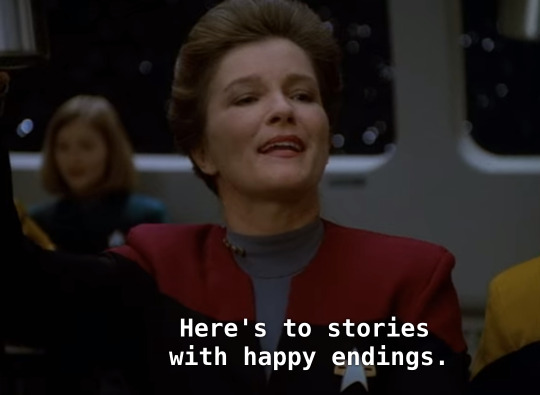

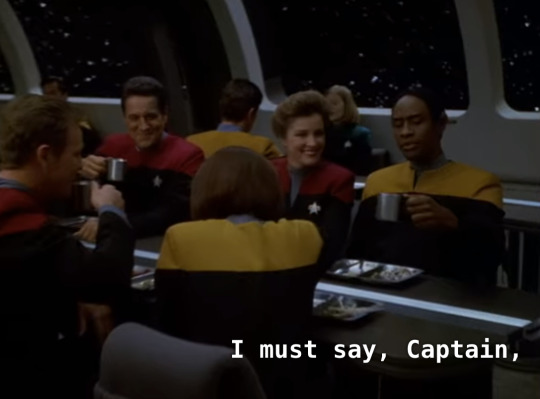


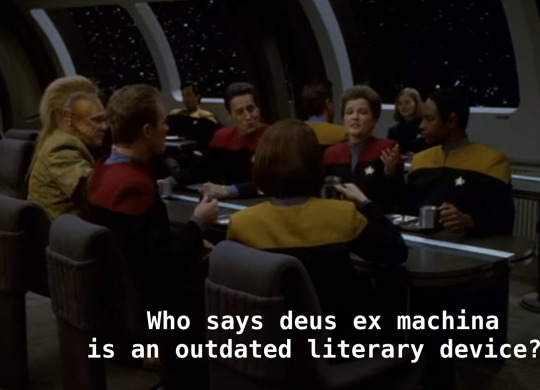
really enjoyed the voyager crew collabing on a little fanfic together in this episode xo
#olivia watches voyager#star trek voyager#'who says deus ex machina is an outdated literary device?' truly the mantra of voyager's writers but i love it ajksndkfjsdgndfg
82 notes
·
View notes
Text
Navigating the Depths of Humanity: A Review of "Moby-Dick" by Herman Melville
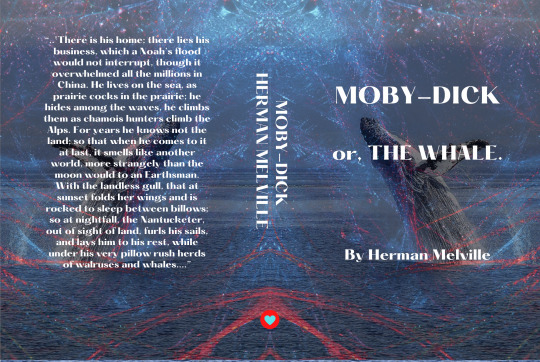
Herman Melville's "Moby-Dick: or, The Whale" is a literary masterpiece that continues to captivate readers with its rich tapestry of adventure, philosophy, and exploration of the human condition. Published in 1851, this epic novel tells the story of Ishmael, a sailor who embarks on a whaling voyage aboard the Pequod, captained by the enigmatic and obsessive Captain Ahab. As the voyage progresses, Ishmael and his shipmates become embroiled in Ahab's relentless quest for vengeance against the great white whale, Moby Dick, leading to a harrowing and ultimately tragic confrontation.
At its core, "Moby-Dick" is a profound exploration of themes such as obsession, fate, and the nature of evil. Through the character of Captain Ahab, Melville delves into the depths of the human psyche, revealing the destructive power of unchecked ambition and the consequences of pursuing one's desires at any cost. Ahab's single-minded pursuit of vengeance against Moby Dick serves as a powerful allegory for the folly of human hubris and the inherent darkness that resides within us all.
One of the most striking aspects of "Moby-Dick" is its vast scope and ambitious narrative structure. Melville weaves together a diverse array of genres, including adventure, philosophy, natural history, and maritime lore, creating a multifaceted and immersive reading experience. From the intricacies of whaling to the metaphysical musings of Ishmael, the novel's narrative is as expansive and boundless as the open sea itself, inviting readers to ponder life's deepest mysteries and contemplate the nature of existence.
Moreover, "Moby-Dick" is renowned for its richly textured prose and vivid evocation of the maritime world. Melville's descriptive powers are on full display as he paints a vivid portrait of life aboard a whaling ship, from the harsh realities of shipboard existence to the awe-inspiring beauty of the ocean's depths. Through his lyrical language and vivid imagery, Melville captures the essence of the sea as both a source of wonder and terror, imbuing the novel with a sense of awe and reverence for the natural world.
In addition to its philosophical depth and evocative prose, "Moby-Dick" is also a timeless meditation on the human condition and the search for meaning in a chaotic and indifferent universe. As Ishmael grapples with questions of identity, mortality, and the unknowable mysteries of existence, readers are drawn into a profound and transcendent journey of self-discovery and enlightenment. Through Ishmael's experiences, Melville reminds us of the fragility of human life and the enduring power of the human spirit to find meaning and purpose in the face of adversity.
In conclusion, "Moby-Dick" is a towering achievement of American literature that continues to resonate with readers for its profound insights, rich imagery, and timeless relevance. Melville's magnum opus stands as a testament to the enduring power of the human imagination and the boundless depths of the human soul. With its epic scope, philosophical depth, and unforgettable characters, "Moby-Dick" remains a masterpiece of world literature and a testament to Melville's enduring genius.
Herman Melville's "Moby-Dick: or, The Whale" is available in Amazon in paperback 22.99$ and hardcover 29.99$ editions.
Number of pages: 314
Language: English
Rating: 10/10
Link of the book!
Review By: King's Cat
#Moby-Dick#Herman Melville#Novel#American literature#Whaling#Adventure#Obsession#Revenge#Captain Ahab#Ishmael#The Pequod#Great white whale#Symbolism#Fate#Human condition#Philosophy#Maritime#Sea voyage#Hubris#Tragedy#Allegory#Nature#Existentialism#Metaphysical#Literary classic#Characterization#Epic#Ambitious
3 notes
·
View notes
Text
me explaining to my partner how the chapter of demeter log entries are one of the most horrifying and chilling parts of dracula because of dramatic irony alone

#that’s not even including other literary devices or noted interactions btwn ppl on the ship#dramatic irony alone fuels this section#we know what’s going to happen to these people on their doomed voyage#and just reading it gives me chills and has me biting my nails#it’s just so INSIDIOUS#anyways i’m definitely seeing that movie based off of the log of the demeter chapter#i just hope they do it well and don’t give it a good ending#dracula#queue me baby one more time
8 notes
·
View notes
Text
Not much music left inside us for life to dance to. Our youth has gone to the ends of the earth to die in the silence of the truth. And where, I ask you, can a man escape to, when he hasn't enough madness left inside him? The truth is an endless death agony. The truth is death. You have to choose: death or lies. I've never been able to kill myself.
Louis-Ferdinand Céline, from Journey to the End of the Night, 1932
#Voyage au bout de la nuit#french literature#agony#realism#death#Louis-Ferdinand Céline#Journey to the End of the Night#music#books and libraries#literary text#world literature#quotes#dark acadamia aesthetic#classic literature#relentless despair#existential thoughts#existentialism#louis ferdinand celine
42 notes
·
View notes
Text
Navigating the Depths of Humanity: A Review of "Moby-Dick" by Herman Melville
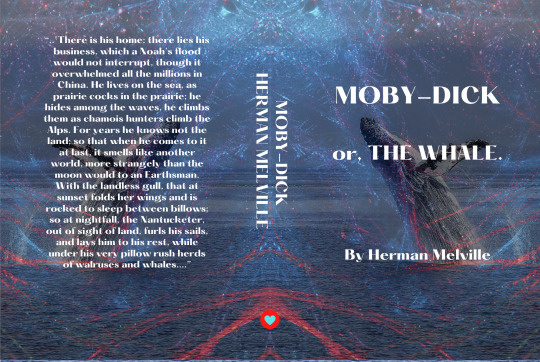
Herman Melville's "Moby-Dick: or, The Whale" is a literary masterpiece that continues to captivate readers with its rich tapestry of adventure, philosophy, and exploration of the human condition. Published in 1851, this epic novel tells the story of Ishmael, a sailor who embarks on a whaling voyage aboard the Pequod, captained by the enigmatic and obsessive Captain Ahab. As the voyage progresses, Ishmael and his shipmates become embroiled in Ahab's relentless quest for vengeance against the great white whale, Moby Dick, leading to a harrowing and ultimately tragic confrontation.
At its core, "Moby-Dick" is a profound exploration of themes such as obsession, fate, and the nature of evil. Through the character of Captain Ahab, Melville delves into the depths of the human psyche, revealing the destructive power of unchecked ambition and the consequences of pursuing one's desires at any cost. Ahab's single-minded pursuit of vengeance against Moby Dick serves as a powerful allegory for the folly of human hubris and the inherent darkness that resides within us all.
One of the most striking aspects of "Moby-Dick" is its vast scope and ambitious narrative structure. Melville weaves together a diverse array of genres, including adventure, philosophy, natural history, and maritime lore, creating a multifaceted and immersive reading experience. From the intricacies of whaling to the metaphysical musings of Ishmael, the novel's narrative is as expansive and boundless as the open sea itself, inviting readers to ponder life's deepest mysteries and contemplate the nature of existence.
Moreover, "Moby-Dick" is renowned for its richly textured prose and vivid evocation of the maritime world. Melville's descriptive powers are on full display as he paints a vivid portrait of life aboard a whaling ship, from the harsh realities of shipboard existence to the awe-inspiring beauty of the ocean's depths. Through his lyrical language and vivid imagery, Melville captures the essence of the sea as both a source of wonder and terror, imbuing the novel with a sense of awe and reverence for the natural world.
In addition to its philosophical depth and evocative prose, "Moby-Dick" is also a timeless meditation on the human condition and the search for meaning in a chaotic and indifferent universe. As Ishmael grapples with questions of identity, mortality, and the unknowable mysteries of existence, readers are drawn into a profound and transcendent journey of self-discovery and enlightenment. Through Ishmael's experiences, Melville reminds us of the fragility of human life and the enduring power of the human spirit to find meaning and purpose in the face of adversity.
In conclusion, "Moby-Dick" is a towering achievement of American literature that continues to resonate with readers for its profound insights, rich imagery, and timeless relevance. Melville's magnum opus stands as a testament to the enduring power of the human imagination and the boundless depths of the human soul. With its epic scope, philosophical depth, and unforgettable characters, "Moby-Dick" remains a masterpiece of world literature and a testament to Melville's enduring genius.
Herman Melville's "Moby-Dick: or, The Whale" is available in Amazon in paperback 22.99$ and hardcover 29.99$ editions.
Number of pages: 314
Language: English
Rating: 10/10
Link of the book!
Review By: King's Cat
#Moby-Dick#Herman Melville#Novel#American literature#Whaling#Adventure#Obsession#Revenge#Captain Ahab#Ishmael#The Pequod#Great white whale#Symbolism#Fate#Human condition#Philosophy#Maritime#Sea voyage#Hubris#Tragedy#Allegory#Nature#Existentialism#Metaphysical#Literary classic#Characterization#Epic#Ambitious
1 note
·
View note
Text
Review: The Adventures of Amina al-Sirafi by S.A. Chakraborty
Author: S.A. ChakrabortyPublisher: Harper VoyagerReleased: February 28, 2023Received: Own (BOTM)
Sign up for BOTM | More BOTM Reviews
Book Summary:
Amina al-Sirafi has had a long and interesting career. It’s earned her many names and titles. Most of which she is fond of, some proud of. Unfortunately, that sort of fame makes it difficult to peacefully find retirement.
Enter her current…

View On WordPress
#Book#Book of the Month#Book Review#Books#BOTM#Fantasy#Fantasy Horror#Fantasy Novel#Fantasy Novella#Fantasy review#Fiction#Harper Voyager#Literary#Literature#Review#The Adventures of Amina al-Sirafi#The Adventures of Amina al-Sirafi by S.A. Chakraborty
0 notes
Text
Janeway and Chakotay totally slept together in "Timeless"
The evidence:

That is NOT platonic lighting.
And then she greets him with "I hope you've got an appetite" in that extra soft, sultry voice she only uses when she's alone with him
Then, in the same voice, "It's a special occasion"
She also mentions "After desert"—but at no point does she actually mention having made dessert!
And then… she walks over to him, touches him on the shoulder, and says…

"Are you ready to try some home cooking?"
Like. Excuse me? I don't care how close we are, if someone I'm in a platonic relationship with talks to me like that, I would assume it is no longer platonic.
But then! He puts down his PADD…

And the very next shot! Is it still on her table, frosted over, 15 years later!

HE DIDN'T LEAVE WITH IT THAT NIGHT
BECAUSE HE DIDN'T LEAVE AT ALL
They slept together, your honor😭
#jen watches stuff#voyager#star trek#star trek voyager#Janeway#kathryn janeway#Captain Janeway#chakotay#j/c#janeway x chakotay#kate mulgrew#robert beltran#Timeless#My theories#My literary analysis
401 notes
·
View notes
Text
Literary Africa—outside, notably, of the work of some white South African writers—was an inexhaustible playground for tourists and foreigners. In the novels and stories of Joseph Conrad, Isak Dinesen, Saul Bellow, Ernest Hemingway, whether imbued with or struggling against conventional Western views of benighted Africa, their protagonists found the continent to be as empty as the collection plate—a vessel waiting for whatever copper and silver imagination was pleased to place there. Accommodatingly mute, conveniently blank, Africa could be made to serve a wide variety of literary and/or ideological requirements: it could stand back as scenery for any exploit, or leap forward and obsess itself with the woes of any foreigner; it could contort itself into frightening malignant shapes in which Westerners could contemplate evil, or it could kneel and accept elementary lessons from its betters.
For those who made either the literal or the imaginative voyage, contact with Africa, its penetration, offered thrilling opportunities to experience life in its inchoate, formative state, the consequence of which experience was knowledge—a wisdom that confirmed the benefits of European proprietorship and, more importantly, enabled a self-revelation free of the responsibility of gathering overly much actual intelligence about African cultures. So big-hearted was this literary Africa, its invitation to explore the inner life was never burdened by an impolite demand for reciprocal generosity. A little geography, lots of climate, a few customs and anecdotes became the canvas upon which a portrait of a wiser or sadder or fully reconciled self could be painted.
[...] Thus the literature resounded with the clash of metaphors. As the original locus of the human race, Africa was ancient; yet, being under colonial control, it was also infantile. Thus it became a kind of old fetus always waiting to be born but confounding all midwives. In novel after novel, short story after short story, Africa was simultaneously innocent and corrupting, savage and pure, irrational and wise. It was raw matter out of which the writer was free to forge a template to examine desire and improve character. But what Africa never was was its own subject, as America has been for European writers, or England, France, or Spain for their American counterparts.
—Toni Morrison, "On 'The Radiance of the King.'" The New York Review, 2001.
294 notes
·
View notes
Text
"[W]hen you're my age you'll see that the world is crammed with delightful things. I think young people make such a mistake about that -- not letting themselves be happy. I sometimes think that happiness is the only thing that counts. I don't know you well enough to say, but I should guess you might be a little inclined to -- when one's young and attractive -- I'm going to say it! -- everything's at one's feet."
~Virignia Woolf, The Voyage Out (1915)
#virginia woolf#the voyage out#quotes#lit quotes#literature quotes#literary quotes#literature#literary quotations#quotations#book quotes#book excerpt#literary excerpts#british lit#british literature#british literature quotes#english lit#english literature#english literature quotes#modernism#modernist literature#british author#english author#classic lit#classic lit quotes#classic literature#classic literature quotes#youth#life quotes#being young#20th century lit
49 notes
·
View notes
Text
guys, i need you to all give me your maritime horror recs. this has been something i've loved my whole life and it's only just occured to me to search tumblr for this so, give me your recs. i've only experienced a few pieces of media like this but so you get what i'm going for:
into the drowning deep - this is my roman empire, this shit is exactly what i want. what the fuck is out there and in what ways will it fuck us up?
our wives under the sea - i wanted to love this so bad but it just,,,,wasn't it for me? i think it was too literary and not enough horror for me
eeler's choice - i listened to the first ep of this today and i am interested, what is up with those eels
also not quite the same but shout out to the voyage of the demeter section of dracula because that's got the right levels of spookiness and despair and maritime superstition
if you guys have recs for any kind of media i will take them, but especially books or games cause that's what i'm most likely to actually follow through with, but i need more of this content so
#alex had a single thought#maritime#horror#maritime horror#books#horror books#audio drama#horror audio drama#marine#marine horror#horror games#games#idk man i'm tagging everything i can think of i need recs
106 notes
·
View notes
Text
As early as 1700, Samuel Sewall, the renowned Boston judge and diarist, connected “the two most dominant moral questions of that moment: the rapid rise of the slave trade and the support of global piracy” in many American colonies [...]. In the course of the eighteenth century, [...] [there was a] semantic shift in the [literary] trope of piracy in the Atlantic context, turning its [...] connotations from exploration and adventure to slavery and exploitation. [...] [A] large share of Atlantic seafaring took place in the service of the circum-Atlantic slave trade, serving European empire-building in the Americas. [...] Ships have been cast as important sites of struggle and as symbols of escape in [...] Black Atlantic consciousness, from Olaudah Equiano’s Interesting Narrative (1789) and Richard Hildreth’s The Slave: or Memoir of Archy Moore (1836 [...]) to nineteenth century Atlantic abolitionist literature such as Frederick Douglass’s My Bondage and My Freedom (1855) or Martin Delany’s Blake (1859-1862). [...] Black and white abolitionists across the Atlantic world were imagining a different social order revolving around issues of resistance, liberty, (human) property, and (il)legality [...].
---
Using black pirates as figures of resistance [...], Maxwell Philip’s novel Emmanuel Appadocca (1854) emphasizes the nexus of insatiable material desire and its conditions of production: slavery. [...] [T]he consumption of commodities produced by slave labor itself was delegitimized [...]. Philip, a Trinidadian [and "illegitimate" "colored" child] [...], published Emmanuel Appadocca as a protest against slavery in the United States [following the Fugitive Slave laws of 1850.]. [...] [The novel places] at its center [...] a heroic non-white pirate and intellectual [...] [whose] pirate ship [...] [is] significantly named The Black Schooner [...]. One of the central discourses in [the book] is that of legitimacy, of rights and lawfulness, of both slavery and piracy [...]. About midway into the book, Appadocca gives a [...] speech in which he argues that colonialism itself is a piratical system:
If I am guilty of piracy, you, too [are] [...] guilty of the very same crime. ... [T]he whole of the civilized world turns, exists, and grows enormous on the licensed system of robbing and thieving, which you seem to criminate so much ... The people which a convenient position ... first consolidated, developed, and enriched, ... sends forth its numerous and powerful ships to scour the seas, the penetrate into unknown regions, where discovering new and rich countries, they, in the name of civilization, first open an intercourse with the peaceful and contented inhabitants, next contrive to provoke a quarrel, which always terminates in a war that leaves them the conquerors and possessors of the land. ... [T]he straggling [...] portions of a certain race [...] are chosen. The coasts of the country on which nature has placed them, are immediately lined with ships of acquisitive voyagers, who kidnap and tear them away [...].
In this [...], slavery appears as a direct consequence of the colonial venture encompassing the entire “civilized world,” and “powerful ships” - the narrator refers to the slavers here - are this world’s empire builders. [...] Piracy, for Philip, signifies a just rebellion, a private, legitimate [resistance] against colonial exploiters and economic inequality - he repeatedly invokes their solidarity as misfortunate outcasts [...].
---
All text above by: Alexandra Ganser. “Cultural Constructions of Piracy During the Crisis Over Slavery.” A chapter from Crisis and Legitimacy in the Atlantic American Narratives of Piracy: 1678-1865. Published 2020. [Bold emphasis and some paragraph breaks/contractions added by me.]
56 notes
·
View notes
Text
I want to see more Just Some Guy type Klingons in Star Trek. No actually, I DEMAND to see them!
I wanna see more Klingons that have NO ties to the Great Houses what so ever, of zero value to their gentry system.
It’s like how it took us forever to get introduced to Just Some Guy type Vulcan characters through Voyager (and hopefully maybe LWD season 3!)
Just like how not every single Vulcan is going to be borderline Vulcan royalty and/or a science expert, and/or a miracle Human hybrid with identity drama (I see you B’leanna & Spock)
Not every single Klingon is a warrior and we KNOW that because we’ve seen a few it’s just none of them have had any primary focus!
I love Worf and his story but I want the MORE and the OTHER of Klingon culture! I wanna see how Klingons of no political significance live their lives!
I demand to see more Klingon doctors who use combat as physical therapy!
Klingon botanists who engineer the flora of their homeworld to combat Qo’nos’s severe urban pollution!
Klingon linguistics experts who translate literary works from other cultures in their free time!
Give me Klingon monks on pilgrimages to outer worlds!
Give me Klingons who are warriors but whose careers aren’t defined by fighting!
Give me more normal ass Klingons like Kaga the Gagh Master! Klingons whose every action doesn’t cause major diplomatic implications to Klingon gentry/clan politics on the whole!
GIVE ME KLINGON PEASANTS STAR TREK
YOU COWARDS!!
#star trek#Klingons#Klingon#Klingon culture#worf rozhenko#worf son of mogh#Kaga the Gagh master#k’ehleyr#b’elanna torres#Spock#t’pol#Tuvok#vorik#Klingon politics#Klingon royalty#kahless
529 notes
·
View notes
Text
When it becomes really impossible to get away and sleep, then the will to live evaporates of its own accord.
Louis-Ferdinand Céline, from Journey to the End of the Night, 1932
#voyage au bout de la nuit#realism#louis ferdinand celine#journey to the end of the night#french literature#books and libraries#existentialism#literary text#world literature#quotes#dark acadamia aesthetic#classic literature
26 notes
·
View notes